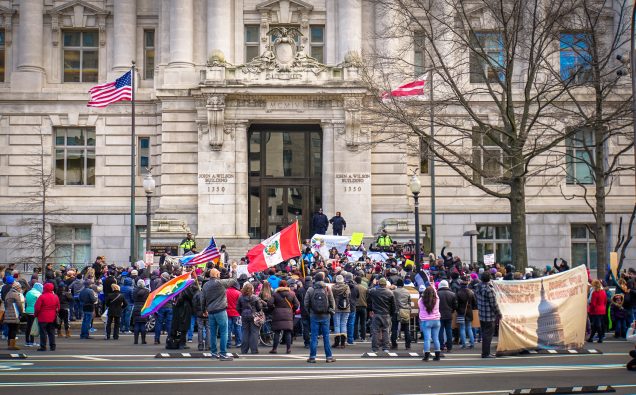
A crowd of people in front of John A Wilson Building in D.C., Photo by Ted Eytan via Wikimedia Commons
As the United States contends with the question of immigration, more Americans, nearly two thirds, now believe that an increasing number of people from different races, ethnic groups and nationalities in the U.S. makes the country a better place to live.
The share, 64 %, that thinks growing diversity makes the country a better place to live, has increased eight points in about six months from August 2016, when a smaller majority (56%) held the view during the election campaign.
The findings by Pew Research Center come as President Donald Trump seeks to curb illegal immigration through a mix of administrative and security measures amidst a heated debate on pros and cons of immigration for the United States’ economy, and its pluralist society.
The Trump Administration’s measures include a travel ban, now frozen under Court orders, on entry of visitors from seven Middle Eastern and African countries and a plan to build a wall along US-Mexico border. The immigration debate broadly revolves around three consideration counterterrorism -aimed at keeping terrorists out and ensuring homeland security – creation of more jobs at home for Americans, and containing crime and violence. Concurrently, Washington also has to deal with the question of taking in refugees fleeing persecution and conflicts like the festering Syrian war.
On Thursday, businesses and activists joined pro-immigration groups to mark a ‘Day without Immigrants’ to highlight contributions immigrants make to the American economy.
According to updated Pew figures, fewer (29%) of Americans think growing diversity in the country does not make much difference, and just 5% think it makes the country a worse place to live.
American diversity, long a hallmark and distinctive feature of the country, is variously seen as a unique melting part or more recently as a salad bowl of cultures, and is reflected in many fields from creative arts to scientific and technological benefits for the United States.
But Americans’ views of diversity appear to be relative to two major factors including education and political leanings.
The Pew survey finds that an overwhelming share of adults with a postgraduate degree (79%) say that growing diversity makes the U.S. a better place to live. Among those with a college degree or some college experience, seven-in-ten view diversity in positive light.
Among those with a high school diploma or less education around 53% think more people of different races and ethnicities in the U.S. makes the country a better place; 36% think it makes no difference either way.
Additionally, the survey says “majorities across all age groups think increasing diversity makes the U.S. a better place, though younger adults are somewhat more likely to say this than adults ages 50 and older.”
The upward shift in Americans’ views of diversity come in the wake of 2016 election debate on diversity and immigration. Since then a series of news reports, debates and articles on immigration and religious and cultural diversity have underscored how in the last few decades, particularly since 1990s, diversity and immigration has been beneficial for both the United States and immigrants.At the same time, Americans want jobs for local populations particularly in inner cities, small towns and rural areas, and in some areas illegal immigrants commit crimes.
Immigrants in the highly skilled categories like IT and medical professional remain in demand in the high-tech companies and services sectors like health. Also, Immigrants in substantial numbers also are associated with restaurants. Overall, immigrants contributed two trillion dollars to the American economy in 2015, according to a study, while American institutions of higher learning draw top scholars, scientists and researchers from around the world. Economic imperatives behind immigration have long collectively shaped cultural diversity of the United States, providing a unique environment for innovation and experimentation in music, film, literature and many other fields of creative arts.
Some American states and cities in New York and California have been more diverse than other parts of the country, and oppose any actions against immigrants.
For its part, the Trump Administration says it has no problem legal immigration but doe not want undocumented people in the United States, especially those involved in criminal activities.
Amidst the ongoing debates and controversies, Pew Research findings are important. Findings say along political lines around 76% of Democrats and Democratic leaning citizens think growing diversity in the U.S. makes the country better. The share of Democrats who say this is up 10 points since August, according to Pew findings.
Significantly, the shift in views is particularly notable among conservative and moderate Democrats with about seven-in-ten (71%) now seeing increasing diversity as making the U.S. a better place – a 12 point rise – up from 59% who saw diversity being positive for America in August.
Among Republicans, the survey reports, “about half think increasing diversity makes the country better (51%), and 38% think it does not make much difference; 8% think growing diversity makes the country a worse place to live.” According to Pew findings, conservative Republicans are about as likely to say growing diversity makes the country a better place to live (45%) as to say it doesn’t make much difference (42%). Views among this group are little changed since August.
Moreover, “moderate and liberal Republicans are more likely to say the country is a better place to live because of growing diversity than to say it does not make a difference (62% vs. 31%).”
Representing a growing support for diversity, the share of moderate and liberal Republicans who think the country is a better place with more diversity is up 11 points since August, Pew Research says.





![By WPPilot (Own work) [CC BY 4.0 (http://creativecommons.org/licenses/by/4.0)], via Wikimedia Commons](https://www.viewsnews.net/wp-content/uploads/2016/04/Statue-of-Liberty-Liberty_Island_photo_D_Ramey_Logan.jpg)










